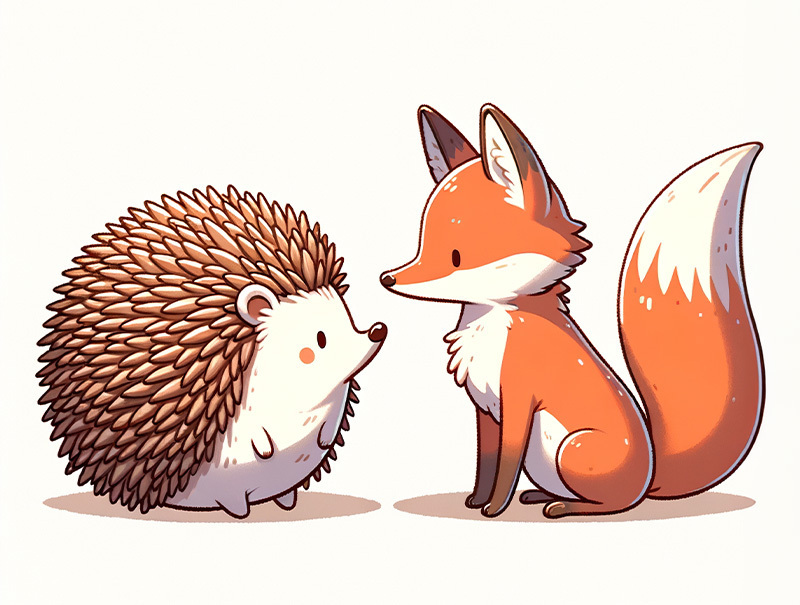
For most entrepreneurs (read: business owners), their world revolves around scanning the horizon for the next great void or need in the market. Once found, exploring a way to fill that void and solve a problem or bring good feelings to the market (while creating a profit for the entrepreneur) sometimes becomes an obsession.
At times, that obsession or exploration results in a loss of focus in the business or operation that brought initial emotional and financial success to the entrepreneur. This can be dangerous in many ways. Obviously, if focus is lost, operational inefficiencies can creep into systems and processes, causing a slowdown in production, degradation of product/service quality, and, ultimately, reduced profitability in the “core” business. Extreme care should be taken as new “target” businesses or product lines come into view.
Well…those who know me personally may know my deep affection for books…. especially the classics. No, not the kinds of classics like Homer’s Iliad and Odyssey…but the business books and quality of life books that have stood the test of time…or at least time enough for me to think they are classics. Books like Stephen Covey’s The Seven Habits of Highly Effective People and Dale Carnegie’s How to Win Friends and Influence People.
Still under consideration by the world…but a slam dunk as a classic in my mind is the 2001 publication of Jim Collins’ Good to Great. In it, Collins defines the characteristics of great companies. Those characteristics are:
It is interesting to me that some of the companies in Collins’ book used as examples of great companies are, sadly, no longer great. It is not that Collins was wrong about what made those companies great. So, why the change for them? They ceased holding dear and following the characteristics. In short, they got lazy and complacent, had a leadership change, and lost focus or drive.
Obviously, I highly recommend that you acquire and read Good to Great studiously. At a minimum, get a book summary. (As a side note, I subscribe to three book summary services for efficiency in what I want to buy and dig deeper into. They are a great time saver for information digestion and then prioritization.) The concept I want to focus on is in the chapter on the Hedgehog Concept (Simplicity within Three Circles).
This concept was born out of an essay, “The Hedgehog and the Fox,” by Isiah Berlin. Berlin divided his view of the world into hedgehogs and foxes. “The fox knows many things, but the hedgehog knows one big thing!”
Foxes pursue many wildly disjointed ends at the same time and see a very complex world. The hedgehog simplifies complex things into a single organizing idea, a basic principle or concept that unifies and guides everything. Anything that does not relate to the hedgehog holds no relevance. Hedgehogs see what is essential and ignore the rest.
The Hedgehog Concept is not just about focus but about profound understanding. It involves discerning what you can be the best at, deeply comprehending what drives your economic engine, and knowing what you are deeply passionate about. Imagine these three aspects as intersecting circles where the confluence represents your Hedgehog Concept. Businesses, according to Jim Collins, thrive not by being a jack-of-all-trades but by channeling their resources towards a single, intersecting point they can master. The Hedgehog Concept is about achieving excellence through simplicity, doing one thing exceptionally well rather than being mediocre in many areas. It’s about making strategic choices to hone the unique aspects that give you a competitive edge, and it requires discipline, insight, and often, hard choices.
So, as an entrepreneur, one must identify his/her Hedgehog Concept. At Vista, our Hedgehog Concept is “Assisting/helping our clients help theirs as efficiently and effectively as possible.” Full stop. If something we are doing does not help our clients, we will not consider doing it! If we can be good (maybe great) at something that does not help our clients, we won’t do it. If we are passionate about something that does not help our clients, we won’t do it. If we can make a ton of money doing something that does not help our clients, we won’t do that either. Do you see a pattern here?
Collins’ belief, and mine, is that Hedgehog-focused businesses consider three guiding principles that, when viewed together (as in a Venn diagram), drive decisions. The principles/questions to consider/answer are:
Does staying focused and the Hedgehog Concept make sense and work for you? It certainly does for me.
Where are you on the continuum of focus? Most of us fall somewhere in the middle…focused but always looking for that next hole in the market to fill that will NOT take us away from our individual Hedgehog Concept. As businesses grow, job functions and objectives do change. Though an entrepreneur may have initiated a business path, he/she may have delegated some of the focus work to others within the core operation. This is not bad as long as he/she does not divert too many resources to any potential new “shiny object.”
The activity required to grow businesses and law firms can be a tricky proposition. What new product lines are close enough to your Hedgehog Concept to be okay? And which are too far away and will cause a lack of focus and dysfunction within your core systems, processes, and team?
I do not have the answer, as every situation is unique. Yet recognizing the situation, working with your internal leadership, and gaining external advice will force a level of discernment that is required in these types of important business expansion decisions. You may not make the right decision, but please, please, please make the decision right! In other words, be a Hedgehog. They are really cool.



